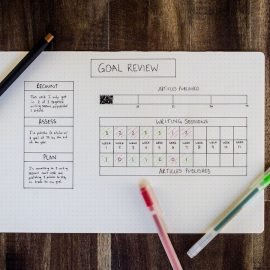

This article gives you a glimpse of what you can learn with Shortform. Shortform has the world’s best guides to 1000+ nonfiction books, plus other resources to help you accelerate your learning.
Want to learn faster and get smarter? Sign up for a free trial here .
Are you dependent on others? How can you be more independent and live freely?
It’s great to have other people in your life who can help you, but there’s nothing more liberating than being able to do things by yourself. No matter if it’s at work, at home, or in a romantic relationship, having independence is a confidence booster.
Here’s how to be more independent and take life into your own hands.
1. Admit You Can’t Control Everything
One way to become more independent is to surrender control of others and focus on controlling your own actions. In Codependent No More, Melody Beattie explains that codependents spend their time and energy trying to control people and their own life. This controlling behavior can either be blatant (“I’m in charge and you’ll listen to me!”) or subtle, through manipulation (“I’ll come with you to see your friends, it’s been ages since I’ve had a night out”) or self-victimization (“I’m so pathetic, please help me”).
When you try to control everyone and everything around you, you’re really the one being controlled by others, Beattie adds. By investing all your energy into someone else’s actions, you give them the keys to your self-control and energy. No matter how you go about trying to exert control, Beattie maintains that you never really succeed. You cannot control other people or events.
According to Beattie, even if you could control other people, it would be a bad idea. By taking control, you prevent the other person from taking responsibility for their actions. Trying to control others stops their natural growth and does more harm than good.
2. Nurture Your Self-Esteem
The second way to be more independent is to nurture your self-esteem. People who depend on others struggle to detach themselves from others because of a lack of self-esteem. People with low self-esteem rely on others to validate their worth, Beattie explains in Codependent No More. Relying on external validation is dangerous, but strong self-esteem lets you control your own life and act in your best interest.
According to Beattie, low self-esteem leads to three problems:
1) Attachment. Many codependents believe they can’t take care of themselves, which leads them to attach to other people. To escape this cycle, you must find worth in yourself, knowing that you can succeed.
2) Bad communication. Codependents learn that open communication is not allowed, so they turn to manipulation, guilt-tripping, and lying to get things done. You can foster good communication by improving your self-esteem.
3) The caretaking cycle. Many codependents try to find validation by taking care of others. This leads to the caretaking cycle. First, the codependent “saves” other people from their responsibilities, which makes them feel good about themself. Second, the codependent feels angry and resentful toward the other person for “using” them, even though the codependent freely assumed the responsibility. Finally, the codependent feels bad for themself, making themself the victim to avoid responsibility.
Trusting yourself is the key to nurturing self-esteem and gaining independence, Beattie says. There are a few ways you can practice trusting yourself:
- Remind yourself of your skills, positive attributes, and past good decisions.
- Practice making small, enjoyable decisions.
- Don’t force yourself to forgive and forget or to trust people over your own judgment.
3. Learn to Love Yourself
Continuing the idea of boosting your self-esteem and confidence, independence also comes from a place of self-love. If you don’t love yourself, you’ll have a hard time making decisions for yourself.
According to Kristin Neff’s book Self-Compassion, practicing self-compassion means showing yourself the same care for your own failures and pain that you’d show someone you care about deeply. Self-compassion centers on two practices that will help you learn how to be more independent:
- Mindfully acknowledge your suffering as-is. In other words, don’t exaggerate or diminish your pain.
- Be kind to yourself when you’re suffering—not critical and judgemental of yourself.
Let’s look at these two practices in more detail so you can learn how to be more independent.
Be Mindful of Your Suffering, As Is
Neff says that seeing your suffering exactly as it is—without amplifying, ignoring, or diminishing it—allows you to respond to your pain compassionately and effectively. She says that suffering is unavoidable, and when you simply acknowledge your pain for what it is—a normal (if undesirable) part of life—you can examine it objectively, soothe yourself, and make decisions from a clear-headed place without the help of others.
Neff says it can be difficult for people to recognize and acknowledge their suffering because they fixate on the flaw or failure that caused it, which overshadows the pain. This fixation creates greater mental anguish and compounds suffering while ignoring its root cause, allowing it to fester. When you’re unable to see, and therefore soothe, the root cause of your suffering, you’re more likely to become entrenched in your misery.
Be Kind to Yourself
Neff says that to be more independent, we can’t simply stop being self-critical, we have to actively give ourselves comfort when we’re in pain, just as we would with a close friend who’s suffering. When you respond to your pain by comforting yourself, you trigger the release of the love and bonding hormone, oxytocin, which reduces fear and increases feelings of calm, safety, trust, and connectedness.
Consistently engaging in this practice sets in motion a healthy cycle of caretaking and caregiving: By becoming more confident in your ability to tend to your own needs, you become more confident in yourself. This confidence allows you to be more independent in the future.
Neff acknowledges that even as you provide yourself compassion, you won’t be able to stop critical and judgmental thoughts about yourself from coming into your head. However, you don’t have to fuel them by believing they’re true. The more gently you treat yourself when you engage in self-criticism, the less space you give your self-loathing to grow.
4. Set Boundaries
Setting boundaries helps you say no so you can be more independent. It’s uncomfortable to set boundaries for work or with family, and you can feel like you’re paying a high price for doing so. But in the long run, boundaries benefit your self-improvement by focusing your limited energy on what’s really important: yourself.
According to Essentialism by Greg McKeown, people have always had trouble with setting boundaries. You’re expected to be available to work at all times, or your parents feel like they can drop in without calling first. Meanwhile, others also make demands on your personal time.
Setting boundaries is part of the process of saying no so you can pursue independence. The price for not pushing back is that demands will keep encroaching to the point that you won’t have any boundaries at all—and others will set your agenda. The trade-off is that you lose your ability to choose what’s most essential in your life, and you’ll end up depending on others to make these decisions for you.
Clear boundaries, however, empower and liberate you to pursue your interests. They allow you to eliminate nonessential demands. They’re also proactive—they free you from having to say no by preempting future demands because others have learned where your lines are.
Push Back Against People Who Ignore Your Boundaries
Still, some people simply don’t recognize boundaries and constantly make demands on your time. Think about how often your weekends are consumed by someone else’s agenda. People who lack boundaries distract you from your purpose and make their problems your problems.
These kinds of people won’t help you on your path to independence. You’ll feel as if you have no freedom to pursue your interests or live your life how you want to. Here are some guidelines for dealing with these kinds of people so you can be more independent.
- Don’t accept someone else’s problem. There’s nothing wrong with helping someone else on occasion, but some people want more than that: they want you to do their work or solve their problems for them. When you do it, you’re enabling them by taking from them their ability to solve it. At work, people often try to shift their problems to you. For instance, a colleague may request your input on a proposal she hasn’t made any effort to develop. You could refuse or agree to look at it later when she’s fleshed it out. Forcing her to solve her own problem helps you become more independent because they won’t come to you to do their work anymore. Of course, setting and publicizing your boundaries ahead of time will prevent this kind of situation.
- Have a plan for handling repeat offenders. When there’s a person who repeatedly distracts you, prepare how you will deflect him in advance. Make a list of the types of requests and activities from him that you’ll refuse unless they align with your agenda. Do this for all of your repeat offenders. To identify people who regularly impose on you, write down any times when you feel resentful or taken advantage of by someone.
- Create an agreement. If you’re going to be working or interacting with someone who violates or lacks boundaries, draw up a social contract. For instance, if you’re tasked to work with an incompatible colleague, establish upfront what you’re trying to achieve, what’s important to each of you, and what you will and won’t do. This will keep you from wasting each others’ time.
With practice, setting and enforcing your limits will become increasingly easier.
5. Rely Less on Your Parents
Growing up, most of us rely on our parents to guide us through the journey of life. Whether it be helping you with your homework, driving you to the mall, or making doctor appointments for you, your parents might’ve been there every step of the way. But the thing about getting older is that you have to do these things yourself, and even parents have a hard time understanding this.
Setting boundaries with parents can be hard because you may think you still need them. However, independence is a part of growing up, and becoming less reliant on your parents is a good first step.
Adult Children of Emotionally Immature Parents by Lindsay C. Gibson has three strategies that can help you manage and create boundaries with your parents:
Strategy 1: Enter each interaction with a clear goal. Setting a goal from the outset helps you take control of the interaction and redefine boundaries with your parent. For example, your goal might be to tell your parent that you can only talk on the phone for five minutes because you’re busy, or that you’ll only spend one night with them over the holidays instead of two because you have a party to attend.
Strategy 2: Focus on speaking your piece clearly and unemotionally. Expressing what you want rather than focusing on your parent’s reaction to you helps honor your authentic needs and feelings. This makes you less likely to be disappointed in their behavior and a step closer to building healthy relationships with others.
Strategy 3: Observe and manage each interaction like an outsider looking in. Observing your interaction with your parent from an emotionally detached place will make you feel less like the child in the relationship. For example, think of yourself as a researcher studying a subject. Silently note, in your head, how your parent’s tone of voice changes, how long they talk to you, and how you’d describe what they say to another person.
Challenges You May Face
Gibson acknowledges that it can be difficult to assert yourself in these new ways. Breaking out of a familiar role, showing your independence, and redefining the terms of your relationship will likely be uncomfortable for everyone involved. Even as you speak your truth, you may hear your parent’s voice in your head saying that if you don’t do things their way, you’ll be sorry.
If during your interaction, your parent says or does something that makes you feel small, scared, vulnerable, or bad about yourself, that’s a sign that they’ve triggered you emotionally. When this happens, you can recenter yourself by focusing on your observational strategies again. You can also try breathing deeply or repeating a phrase in your head that reminds you to emotionally disconnect like, “Let go.”
If you’re unable to emotionally disconnect, make an excuse to walk away from the conversation. Say you have to go to the bathroom, make a phone call, or leave for an appointment. Taking a break allows you to create emotional space so you can regroup and start again, fresh.
Final Words
Now that you’ve taken these steps, you’re on the fast track to an independent lifestyle. It might feel scary stepping out on your own, but you’ll find it freeing to not have to rely on anyone else.
What are some other ways to be more independent? Let us know in the comments below!

Want to fast-track your learning? With Shortform, you’ll gain insights you won't find anywhere else .
Here's what you’ll get when you sign up for Shortform :
- Complicated ideas explained in simple and concise ways
- Smart analysis that connects what you’re reading to other key concepts
- Writing with zero fluff because we know how important your time is






